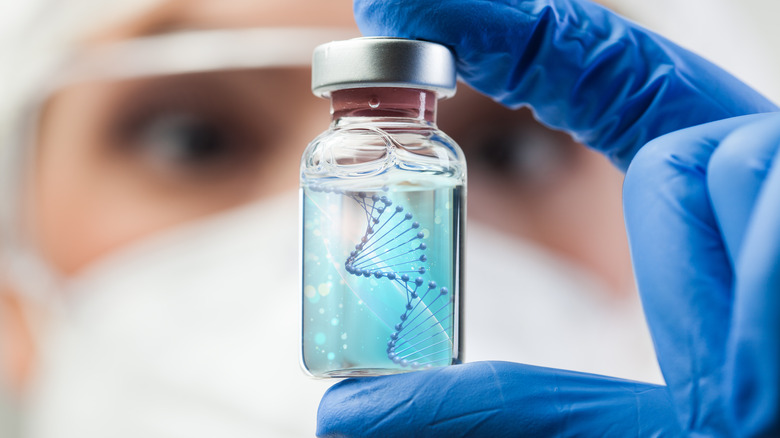Are There Long-Term Effects Of COVID-19 Vaccines?
Even if we disregard all politics that have become synonymous with the COVID-19 pandemic, the advent of this history-making collection of vaccines has been polarizing. Ultimately, scientists and researchers have been working around the clock to create safe, effective vaccines to combat the virus that is wreaking havoc on the world as we know it. To many of us, the research sounds convoluted and hard to follow. Many people have chosen to forgo the vaccine, despite it being deemed safe by the FDA, citing their concerns about the long-term repercussions as their main reason.
The University of Alabama at Birmingham and many other scientific publications have released information regarding the safety of the vaccines, especially when it comes to our collective, long-term concerns. Overall, the experts who have been tasked with creating and studying the myriad COVID-19 vaccines all agree that the technology behind them and the ingredients they contain are safe. Even still, many people are holding off on vaccinating themselves and their children because the vaccines still just seem "so new." Here is everything we know about the very important question you might be asking yourself: Are there long-term effects of COVID-19 vaccines?
mRNA vaccine technology has been safely used in other vaccines
Many of us likely hadn't even heard of mRNA technologies until the COVID-19 vaccine became the star of the world's stage. mRNA stands for "messenger RNA," which is the genetic blueprint of your body and influences the proteins your body creates on a cellular level. Both the Pfizer and Moderna vaccines use this type of technology, which means that they include the spike protein of the virus. These vaccines do not contain the actual virus, simply the spike protein, which is the main viral structure that keeps mutating into differing variants. This is why researchers are so confident that these COVID-19 vaccines cannot actually make you sick with the virus; the spike protein is docile and "harmless" on its own (via Wexner Medical Center).
mRNA vaccines have been studied at length for the flu, Zika virus, and rabies. By injecting the spike protein, the body can replicate it before the mRNA starts to dissipate, which it does shortly after it is injected to the body. Because the mRNA strands that are injected disappear so quickly and never reach the nuclei of your cells, your DNA is never affected by the injections.
Adenovector vaccines aren't new
Unlike the mRNA technology used in the Pfizer and Moderna vaccines, Johnson & Johson and AstraZeneca use "viral vector" technology, according to Wexner Medical Center. Just like mRNA though, the science behind this has been studied at length and has been confirmed to be safe for use in vaccines. Similarly, this vaccine carries a dead version of a virus, though with viral vector technology, the dead virus is a different virus, not the one that the vaccine is intended to combat.
In adenovector vaccines such as these, the virus that is injected carries instructions to help bolster the immune response within the body. These instructions tell your cells to make the same spike protein that the COVID-19 virus contains, thus providing your body with an opportunity to create antibodies against the COVID-19 virus. These types of vaccines have most recently been used to combat Ebola outbreaks, though they have historically been studied in relation to Zika, HIV, malaria, and more.
Vaccine side effects usually appear quickly
As previously explained, the mRNA that gets injected into the body dissipates quickly after it has been received. This means that the powerful ingredients of the vaccine are dispersed, processed, and eliminated through natural, cellular processes. And so, in general, the side effects of a vaccine show up relatively quickly. Historically, this has been the case.
Dr. Paul Goepfert, director of the Alabama Vaccine Research Clinic, has been studying vaccinations and their effects for around 30 years (via The University of Alabama at Birmingham). He explained that side effects of vaccines emerge within the first eight weeks after receiving it. Moreover, though the COVID-19 vaccines were approved on an emergency basis, historically plenty of vaccine testings and trials have been done to confirm that by and large, there would not be any wild side effects. Goepfert references the 1950s rollout of the original polio vaccine to prove this point. Roughly one in every 2.4 million children who received the vaccine responded poorly to the live version of the illness after it had been injected. In each of those cases (which resulted paralysis), the reactions occurred one to four weeks after the oral vaccine had been taken.
To compare, the COVID-19 vaccine does not include a live version of the virus. "None of the COVID vaccines uses a weakened form of the SARS-CoV-2 virus — all train the body to recognize a piece of the virus known as the spike protein and generate antibodies that can attack the virus in case of a real infection," notes The University of Alabama at Birmingham. And so, much of the risk of side effects is mitigated.
Vaccines are eliminated quickly
The COVID-19 vaccines, both the mRNA and viral vector versions, are scientifically designed to provide your body with instructions to combat the virus on its own. Researchers of the vaccines use this to their advantage. Because of how they work, the vaccines are fleeting in nature — meaning the vaccine is given, the body responds, and then the vaccine is eliminated, leaving guidance for your body in its wake. mRNA COVID-19 vaccines inject the spike protein of the COVID virus to provide a blueprint for your immune system to emulate. Viral vector vaccines work mostly the same way, but use a defunct spike protein from a different virus as the model.
Many people have expressed concern over the vaccine in the long-term, but unlike daily medications, for instance, COVID-19 vaccines don't have cumulative effects. As drugs you take every day start to build up in your system, you can begin to experience side effects. mRNA, specifically, gets expelled from the body quickly. In fact, no mRNA vaccine has ever had long-term side effects crop up since the mRNA breaks down so fast (via The University of Alabama at Birmingham). "Vaccines are just designed to deliver a payload and then are quickly eliminated by the body," Dr. Paul Goepfert says. "This is particularly true of the mRNA vaccines. mRNA degrades incredibly rapidly. You wouldn't expect any of these vaccines to have any long-term side effects. And in fact, this has never occurred with any vaccine."
COVID-19 vaccines underwent extensive clinical trials
Since the technologies of the vaccines are not new, the actual ingredients and science have been deemed safe by researchers, the FDA, and others. Rest assured that simply knowing this is not enough for these parties to approve a vaccine, especially on an emergency basis. Each and every approved vaccine has been run through a rigorous battery of clinical trials long before it hit the shelves of your local pharmacy. The minds at University of Missouri Healthcare even state that through the clinical trials, the vaccines get tested on tens of thousands of participants to further ensure that they are safe for distribution.
Furthermore, the FDA surveys the results of the clinical trials and compares them to the risks and side effects. Through this weighing of pros and cons, they can decide if a vaccination is safe for the public. Even after the FDA approves the rollout of a new vaccine, all reactions are closely monitored as a backup means of safety. The makers of the vaccines in question are also required by law to report adverse reactions.
Myocarditis is a rare but potentially long-term side effect
One of the more widely-publicized side effects from the mRNA-based COVID-19 vaccines has been myocarditis. Myocarditis is a condition in which the heart becomes inflamed. This often presents as shortness of breath, chest pain, and irregular rhythms within the heart (such as fluttering or pounding). Myocarditis has been most common following the second mRNA vaccine in young men. Symptoms generally emerge a week after receiving the vaccine, though even this side effect is rare in the grand scheme of how many people have comfortably received the vaccine.
Most patients who experience myocarditis following their vaccines sought out medical care and completely recovered quickly. Even though this has occurred as a result of the COVID-19 vaccines, the Centers for Disease Control and Prevention (CDC) is clear when they state that the rewards far outweigh the risks of receiving a COVID-19 vaccine. They recommend discussing concerns with your doctor if you're hesitant about receiving the vaccine yourself or about giving it to your child.
Get the vaccine even if you had COVID-19
There have been quite a few myths or, um, alternative facts, floating around in regards to COVID-19 vaccines. Many respected and cutting-edge publications have published study after study in order to dispel some of these rumors. We have already discussed one of the main myths that naysayers perpetuate — that the vaccine was rushed and cannot be trusted. This is inherently untrue as the history of the technology, clinical trials, and rigorous testing by the FDA have all been strictly regulated.
Another rumor that has been circulating is in regards to those who have already had COVID-19. This rumor says that if you've already had COVID, you don't need to bother with the vaccine. However, Johns Hopkins Medicine states that this is untrue. The vaccine can still significantly lessen your chances of becoming reinfected with COVID-19 since your level of immunity with the vaccine is higher. Even if you have had COVID, receiving the vaccine will help protect other people by slowing the spread of the virus.
COVID vaccines, pregnancy, and fertility
Another commonly heard myth is that the COVID-19 vaccine affects a woman's fertility and pregnancies. Because of the way the vaccines guide your body into the proper immune response, it leaves the fertility components of a woman's body virtually untouched. According to Johns Hopkins Medicine, this rumor spread like wildfire across social media platforms because a false report claimed that the spike protein in the vaccine would interact with the spike protein involved in the attachment of the placenta. They clearly explain that the two spike proteins are very different and the one included in the vaccine does not affect the placenta. Some clinical trials were conducted on pregnant women as well, all without adverse effects on pregnancies.
The CDC reports that based on the studies and clinical trials, the vaccine is safe and effective in individuals who want to become pregnant as well. It has not been shown to have any affect on male or female fertility. Even so, the research and monitoring of this is still being conducted. They recommend everyone who is eligible should receive the COVID-19 vaccine in order to protect themselves from the potential long-term effects of contracting the COVID-19 virus.
What are your odds of developing long-term side effects?
The chances of developing long-term and long-lasting side effects from any of the COVID-19 vaccines are super rare. This is mostly due to the technology behind the vaccines and the way they are processed within the body. As discussed, all iterations of the vaccine essentially inject a code for the body to replicate and create its own antibodies by. As soon as the vaccine is injected, the ingredients in it start to dissipate, and are quickly expelled through standard bodily functions. Since the vaccines disintegrate so quickly, the likelihood of having a side effect crop up after a few months time is rare.
To reiterate, drugs that are consumed every day can lead to an accumulation within the body, which is often what causes long-term issues down the line, after months or years of taking the same medication repeatedly. Because of the "one-and-done" nature of vaccines — and the COVID-19 vaccine specifically — there is not an opportunity for an accumulation of any kind to occur. All told, your chances of developing long-term effects from the COVID-19 vaccine are next to nothing. This is especially true because no vaccine has ever caused such a long-term side effect (via The University of Alabama at Birmingham).
How do the effects of having COVID-19 compare to the effects of the vaccine?
Perhaps the heaviest pros and cons list in this current climate is the one where we weigh the odds between the vaccine and contracting COVID-19. However, the pros list is expansive and the cons list is poignant and aggressive, tipping the scales in favor of receiving the vaccine. As established, the known side effects of the vaccine are fairly straight-forward and relatively harmless, all things considered.
Unfortunately, the side effects of having COVID are far more concerning, especially when you consider the mutations of the virus that have yet to emerge and be studied. The mechanism behind the lingering side effects of COVID-19 is virtually unknown, which is profoundly concerning to researchers. However, many unvaccinated people who have contracted COVID-19 have lingering symptoms that parlay into "long COVID." All of the unknown factors surrounding the severity of new and emerging variants sits in stark contrast to the evidence and research backing the safety of the COVID-19 vaccines (via The University of Alabama at Birmingham).











